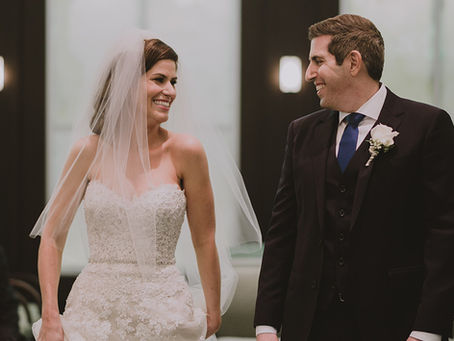top of page
Jewish Weddings & Life Cycle Events
NY WEDDING RABBI LEV HERRNSON
516-232-5946
Search


Passive & Active "Tents"
Your Jewish wedding will take place under the wedding canopy or “chuppah,” a tent-like structure. What happens under the chuppah is up for discussion with your rabbi, but the Jewish tradition has a few things to say about it.

Rabbi Lev Herrnson
Oct 6, 20252 min read


Redux: What's a Chuppah and Why Do We Need One?
I've had a lot of inquiries lately concerning the important of the chuppah . This blog entry of mine from 2015 addresses the questions...

Rabbi Lev Herrnson
Sep 24, 20242 min read


Jewish Wedding Vows: Separate, Not Sexist!
This blog post has been getting a lot of attention lately, so I thought I'd update it and re-post it for everyone's benefit. Long story...

Rabbi Lev Herrnson
Jul 9, 20243 min read


Ani l'Dodi v'Dodi Li--What's In It For Me?
Ani l'Dodi v'Dodi Li First published in April 2015, so many others have "reprinted" this particular entry of mine that it's high time I...

Rabbi Lev Herrnson
Dec 5, 20233 min read


Who Can Sign Our Ketubah?
I recently migrated my blog entries to a new platform and subsequently discovered that this entry had over 5,000 views! I guess it's...

Rabbi Lev Herrnson
Dec 5, 20233 min read


What is Circling? Why circle at my wedding?
At a traditional Jewish wedding, after the processional but before the actual start of the ceremony, the bride will circle clockwise...

Rabbi Lev Herrnson
Dec 5, 20233 min read


Marriage License and Ketubah: Do We Need Both?
I'm going to estimate that upwards of 20 marrying couples come to me each year with with this question: Do we need both a marriage...

Rabbi Lev Herrnson
Dec 5, 20232 min read


Jewish Wedding Vows: Separate, Not Sexist!
Recently a couple came to me and reported that they felt repulsed by the traditional Jewish wedding vows. Recited during the ring...

Rabbi Lev Herrnson
Dec 5, 20233 min read


Top Blog Entry: Who Can Sign My Ketubah?
This blog post is a perennial favorite with over 10,000 views! I guess it's high time I re-post this one! Let's roll back the meter on...

Rabbi Lev Herrnson
Jul 5, 20223 min read


Planning Your Destination Jewish Wedding (Redux)
Planning Your Destination Jewish Wedding

Rabbi Lev Herrnson
Jul 9, 20215 min read


Marriage License and Ketubah: Do I Need Both?
As this question seems to come up a lot, I've decided to re-post this blog entry from 2015. Please read on to learn about these two...

Rabbi Lev Herrnson
Mar 31, 20212 min read


Who Can Sign My Ketubah?
I recently migrated my blog entries to a new platform and subsequently discovered that this entry had over 5,000 views! I guess it's...

Rabbi Lev Herrnson
Sep 13, 20193 min read


Ani l'Dodi v'Dodi Li--What's In It For Me? (Redux)
Ani l'Dodi v'Dodi Li So many others have "reprinted" this particular entry of mine that it's high time I present here once again. (First...

Rabbi Lev Herrnson
Sep 4, 20193 min read


Jewish Wedding Do's and Don'ts
Things to do and things not to do when planning your Jewish wedding

Rabbi Lev Herrnson
Dec 7, 20184 min read


How to Choose Your Ketubah (Redux)
Like the marriage you are about to consecrate, choosing a ketubah is an exercise in tradition, creativity, personal preference, and...

Rabbi Lev Herrnson
Oct 7, 20164 min read


Planning Your Outdoor Jewish Wedding
While every wedding is magical, festive and beautiful, there’s something special about a wedding that takes place outdoors. Flowers,...

Rabbi Lev Herrnson
Jul 17, 20153 min read


What's a Chuppah and Why Do We Need One?
The chuppah is the single most recognizable symbol of a Jewish wedding—other than breaking a glass at the conclusion of the ceremony. ...

Rabbi Lev Herrnson
May 26, 20152 min read


Ani l'Dodi v'Dodi Li--What's In It For Me?
Source and Meaning of the Verse Ani l’dodi v’dodi li—“I am my beloved’s and my beloved is mine,” is excerpted from “The Song of Songs”...

Rabbi Lev Herrnson
Apr 21, 20153 min read


Jewish Wedding Booklet--Do We Need A Program?
Many couples choose to distribute a wedding program or booklet at the onset of their Jewish wedding ceremony. Do you need a booklet at...

Rabbi Lev Herrnson
Apr 14, 20152 min read


What is Circling? Why circle at my wedding?
At a traditional Jewish wedding, after the processional but before the actual start of the ceremony, the bride will circle clockwise...

Rabbi Lev Herrnson
Mar 25, 20153 min read
bottom of page